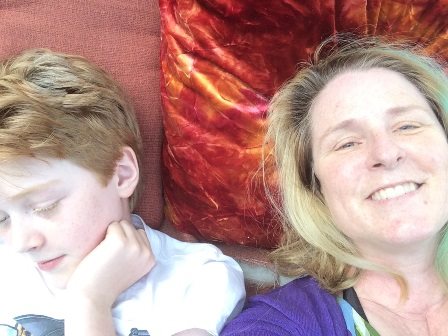 Here’s a pic from last summer. I’m lying on the hammock with the greatest person I have ever met in my life- my nephew David.
Here’s a pic from last summer. I’m lying on the hammock with the greatest person I have ever met in my life- my nephew David.
He has taught me so much.
He turned 13 this year and the inevitable changes are happening in our relationship. When he turned 11, I started talking with him about the changes he would experience as he became a teenager so that I could prepare myself for when nights at home with Auntie Wee would not be a priority.
I believe we can talk to kids from a very young age about emotions and behaviors so that they can learn empathy, compassion, self belief and personal strength as they get older. I started teaching David about bipolar disorder when he was four. I wanted him to understand his Auntie Wee even if he could not intellectually express what he was seeing- I knew the emotions were there and that he would need to know why there were some days where I talked like a Tasmania devil and on others I had trouble getting out of bed.
He tells me now that all of the talk about my illness helped.
We were in Starbucks last week and had the following conversation:
Julie (also known as Auntie Wee): David, have you noticed that you don’t want to spend as much time with me as you used to?
David: (Looks at me a bit surprised) Yes! I have!
Julie: Did you know that’s normal. It has a lot to do with testosterone and getting older. You’re more interested in being with your guy friends and doing role playing and use your nerf guns. You probably don’t want to hang out with your mom and grandma as much either.
David: (Looking even more surprised) Yes! Is that why I want to spend a lot more time with my dad?
Julie: Of course- you want to do guy stuff. Are you more interested in girls?
David: I am.
Julie: That is completely natural too. I am fine with spending less time with you. Let’s figure out what you can do with your dad this summer so that you can spend more time together.
David: Cool.
I then did a little jig at the counter to embarrass him. HAHa.
The next week, we talked with his dad about doing jujitsu together and David signed up and my brother took him to his first class!
Learning to talk with kids takes practice. I have experimented using all of my coaching skills with younger kids and teens- and it’s working.
If you have bipolar disorder, I believe it’s important to let the kids know what you are going through in an intellectual way- being overly emotional is not helpful in my option. Explaining what is happening and how kids can help- even kids as young as four can make a huge difference in THEIR future. They are allowed to grow and have their own lives even when you might be struggling.
Julie







Hi Julie. I’m so pleased to see your article to help children understand bipolar disorder. I come from a family of those affected by bipolar, schizophrenia, and anxiety disorder. I remember my family taking my sister to the hospital… She was suicidal at age 8! No one talked to me about anything, so of course being a child, I felt responsible.
There certainly needs to be some support for kids, so, I wrote a book for 3-11 yr olds and for teens of parents with bipolar disorder. The first book in particular tells kids it’s not their fault; they didn’t do anything wrong. Each book contains a story, health info section, and an educational component (draw/write activities, word searches, etc.) to help kids express their anxiety, fears, etc. These resources ultimately help kids to understand that BD is a manageable condition if the right supports are in place.
You seem like a very good aunt 🙂 Your nephew is lucky to have you.
Thank you! He changed my world for the better. That’s for sure! Julie